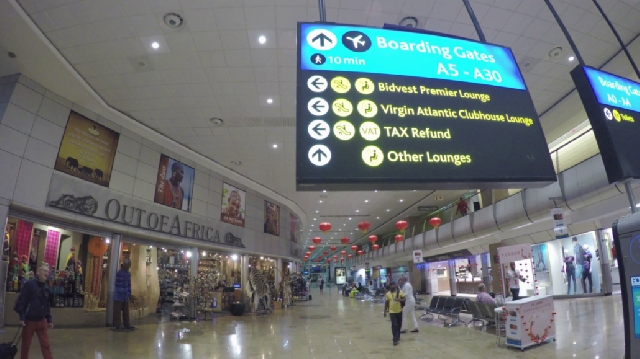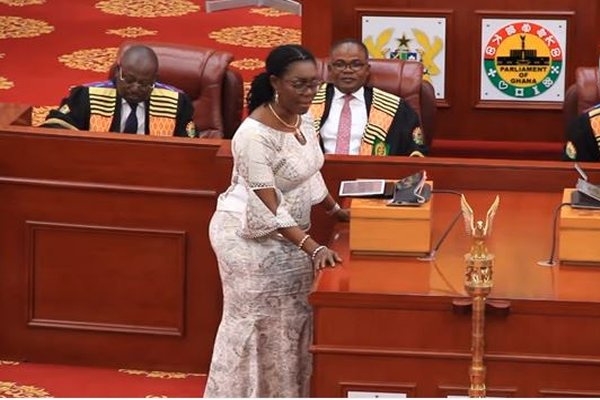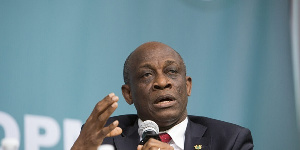Adongo warns BoG Governor against credibility crisis of Central Bank

The conduct of the Governor of the Bank of Ghana is bringing down the revered institution into serious credibility crisis, the Member of Parliament for Bolga Central, Isaac Adongo has said in another letter to the BoG Chief.
It would be recalled that the lawmaker in May, 2018 wrote to the Governor of the Central Bank, Dr. Ernest Addison requesting some information to assist him in his work, which he was flatly denied.
But Adongo has issued another letter addressed to the BoG Governor cautioning that the “continuous manipulation of the Policy Rate that is not consistent with the fundamentals of the economy and concealing of critical economic data will further worsen the credibility crisis of BoG and derail any efforts at attracting badly needed investments into the country.”
A copy of the letter is published below
Bank of Ghana (BoG),
P.O Box 1989,
Accra.
Dear Governor Addison,
Please accept my warm greetings.
You would recall my earlier letter to you dated 22nd May, 2018, in which I requested some information to assist me with my work.
Surprisingly though, you chose to ignore that request. I pray this is not a norm at the bank under you.
In that letter, however, I advised you to stop fuelling systemic risks in the financial sector, and to rather work to address the loss of credibility in the sector. I am compelled to write to you a second time about the erosion of confidence in Bank of Ghana (BoG), our central bank, and the simmering credibility crisis of the institution due to manipulation and apparent concealment of economic data, ostensibly to deceive investors and players in Ghana’s financial markets.
A review of BoG’s Summary of Macroeconomic and Financial Data and the Monetary Policy Committee (MPC) press statements show a very worrying trend, that I want to bring to your attention. This trend is creating serious credibility deficit in the Central Bank, especially now that the extended credit facility (ECF) arrangement with the International Monetary Fund (IMF) is ending, with international investors having uncertainties about policy and institutional credibility, going forward.
The following are among some of the worrying issues:
1. Concealment and manipulation of Net International Reserves (NIR)
It is very interesting to note that your July 2018 and May 2018 MPC Press Statements were very quiet on Ghana’s Net International Reserves position. Why was this so? Apparently, this was because Ghana’s net international reserves had been worsening since May 2018 when it recorded USD4.65 billion. By October 2018, BoG had drawn down about USD1.3 billion of the reserves in response to portfolio reversals and mounting pressure on the cedi. Indeed, Ghana’s international reserves fell dangerously low to USD3.3 billion that could only cover 1.8 months of imports. As a result of this precarious NIR position, the country began to experience high levels of vulnerability. Government’s efforts at increasing borrowing to provide more forex faltered because investors were not interested in lending to Government unless interest rates were increased. In the process, the government’s borrowing, gap referred to as uncovered auction, increased to over GHC5 billion – USD1.04 billion, using an exchange rate of GH4.8 to USD1.
Sadly, BoG unethically and unprofessionally decided to falsify Ghana’s NIR to mislead investors and the markets by suddenly adding Ghana’s Petroleum Holding Funds to our net reserves. This was a serious misconduct that was clearly against the IMF’s Balance of Payments Manual 5 (BPM5) guidelines on the definition of NIR. The Petroleum Holding Funds are encumbered funds which are not available to BoG and cannot be added to its reserves.
Therefore, by adding it to the NIR, it was equivalent to stealing someone’s money to add to yours to avoid being identified for your true level of poverty.
As you are aware, the BPM5 is designed by the IMF and provides international standards and guidelines for compiling balance of payment (BOP) statistics. It is actually your Bible and that of all Central Banks in compiling balance of BOP statistics yet I observed that you decided to violate it with impunity, even under a Fund program.
As a result of this manipulation and concealment of the true data on Ghana’s NIR position, the markets were deceived into taking decisions based on such falsified economic data.
Interestingly, you adjusted the NIR in your latest Summary of Economic and Financial data, which gives completely different figures for the various months of the year from what was reported in November 2018.
Mr Governor, this is chaotic, unethical and insincere. It is observed that this time, you added another USD600 million to our NIR position as at December 2018 to increase the figure from USD3.2 billion to USD3.8 billion, apparently to hide the true state of our reserves and the unprecedented draw down in NIR.
Mr Governor, I want to take the opportunity to urge you to desist from such behaviour and to stop cooking Ghana’s economic data. Let us be true and consistent in approach as prescribed by international standards and tell the true story of Ghana’s economic performance.
Based on the projections of possible global economic downturn, Ghana, as a commodity exporting nation, has to be extremely worried about the low levels of NIR, especially in the face of a cumulative trade surplus of USD3 billion.
Strangely, however, we failed to build on our NIR and that has now exposed the cedi to severe headwinds, going forward, and this must be informing monetary policy actions and not fictitious economic data to lure investors.
For example, it is worrisome that the level of NIR as at end-2018 is less than what it was on 31st December 2016. This is in spite of the fact that the country made a cumulative USD3 billion trade surplus, mainly from oil exports, between 2017 and 2018. This means that effectively, our external vulnerability has worsened as a country, resulting from excessive BoG intervention to support the depreciating cedi.
Mr Governor, I want to appeal to you to stop endangering Ghana’s international reserves through such excessive intervention in the forex markets. Please allow the cedi to adjust to the shocks and thereby save the reserves for a rainy day. Otherwise, if we experience a sudden increase in capital flow reversals or a slump in world commodity prices, going forward, we will be forced back to the IMF even after the intended exit this year. Henceforth too, BoG should ensure that it is reporting Ghana’s NIR accurately in its Summary of Macroeconomic and Financial Data and MPC Press Statements to give transparency and clarity to the markets and not seek to hide things in a manipulated Summary of Macroeconomic and Financial data.
2. Manipulative Policy rate cuts and Policy Distortions
Mr Governor, it is becoming very clear that MPC meetings are now focusing on deceiving investors when Government is about to go cup in hand on a road show to borrow money. It is very strange to see any serious fundamentals of the economy and the thrust of monetary policy that supports your recent Policy Rate cut. In particular, the data contained in your MPC Press Statement and the Summary of Macroeconomic and Financial data do not support 28th January, 2019 Policy Rate cut. For example:
i. Inconsistency in overall BOP: Mr Governor, it is curious to note that despite ignoring my letter of 22nd May, 2018 (which bothered on data inconsistency), you appear to have entrenched it and now extending same from the banking sector to the external sector.
In your MPC press statement of January 28, 2019, you said the overall BOP had deteriorated from a surplus of USD1.1 billion in 2017 to a deficit of USD671.5 million in 2018, equivalent to 1.0% of GDP. Interestingly, however, the Summary of Macroeconomic and Financial Data for January 2019 captures the overall BOP as of December 2018 at a deficit of USD1.28 billion, equivalent to 2.0% of GDP. Where did you get the deficit of US$671 million from? This is grossly unethical and connotes an active attempt to conceal data in other to deceive the public and investor community in particular.
ii. While I am unable to decide which of the overall BOP deficit figures to use for my analysis, I have, on my own prerogative, decided to base it on the USD671 million deficit that was contained in your press statement. The curious question with that deficit is: why is the BOP for 2018 in deficit despite a trade surplus for 2018? This is because of capital flight as investors are taking their monies invested in Government Bonds in search of better yields abroad. That is why you are having a precarious NIR position despite a cumulative USD3 billion trade surplus over the last two years.
To reverse this vulnerability and improve foreign currency liquidity would require a monetary policy stance that attracts more foreign exchange denominated investments into the country. This is not achieved with Policy Rate cuts because that will rather drive away portfolio investors leading to further capital flight and flow reversals. So what is the basis for this fictitious Policy Rate cut? One wonders if it is meant to deceive investors to price low for the USD3 billion Eurobond foray planned later this year.
iii. The constant regulatory tyranny in the last quarter of 2018 produced foreign exchange rates and depreciation figures you wanted to see and not what the market produced. The cedi crossed the GHC5 to USD1 mark way back in October 2018. As you and your staff continued to warn and threaten banks whose exchange rate quotations exceeded the GHC5 mark in their Intraday reports, the banks began not to quote their actual rates for foreign exchange transactions, Hence, the data you have released on exchange rates and depreciation of the cedi are suppressed and do not reflect the market value of the cedi.
Mr Governor, I want to, again, urge you to desist from manipulating the market with threats and tyranny to allow market forces to dictate the exchange rate. We are now indirectly operating a controlled exchange rate regime and that distorts market information.
iv. Interest rate distortions between Policy Rate and various instruments: The conduct of BoG and the recent interest rates movements on Government’s risk-free debt instruments suggest that both the Government and BoG have no trust in the economic data that have influenced Policy Rate cuts in recent times. While BoG is cutting interest rates to signal a downward trajectory of interest rates, the same BoG and Government are raising interest rates on benchmark risk-free instruments to signal rising risk-free costs of capital. What that means is that the market is being told that you can lend to Government at a high interest rate and, therefore, before you lend to any other person, your starting interest rates is what Government will pay you and it is rising so charge a premium above what Government pays. Does this reflect a BoG that believes in its policy rate decisions?
Table 1: T’Bills Interest rates and Bond Yields movements in the last 2 years:
The above shows that as you have continued to artificially cut policy rates to deceive the people and score cheap political points, the fundamentals of the economy, which you recognise in pricing Government securities, are showing that interest rates are going up and should be going up.
v. Struggling Economy
The data released for the MPC meeting as reported in the Summary of Macroeconomic and financial data, show an economy that is struggling to support productive activities and require a deliberate policy to inject the needed foreign direct investment and improved appetite of lenders to Government to raise the needed resources to fund the economy and revive several ailing sectors of the real economy in the last two years. The data is showing very worrying spectacle.
ECONOMIC GROWTH- JANUARY TO SEPTEMBER
It is clear from the above that the economy needs serious stimulus to return to its robust non-oil GDP growth in 2016. BoG’s own Composite Index of Economic Activity (CIEA) supports the fact that the economy is struggling.
Table 2: BoG Real Sector Indicators (CIEA) –November 2017/November 2018
All the indicators of your own surveys show deteriorating economic performance on your composite index of economic activity. As a matter of fact the high business and consumer confidence started disappearing towards the end of 2017 and has now worsened per your own data.
To summarise, this requires investment by Government to propel the non-oil sector of the economy to replace the dominant performance of oil since 2017. With Government facing significant uncovered auctions of about GHC5 billion in 2018 and massive portfolio flow reversals, monetary policy should rather focus on eliminating the unattractiveness of Government Debt instruments. The continuous manipulation of the Policy Rate that is not consistent with the fundamentals of the economy and concealing of critical economic data will further worsen the credibility crisis of BGG and derail any efforts at attracting badly needed investments into the country.
Mr Governor, we have been enjoined to be citizens and not spectators, and it is in this direction and in performing my civic duties to my constituents in Bolgatanga that I took it upon myself to write you this letter.
It is my hope that the issues I have raised will be addressed for the sake of the good people of this country, and out of respect for the high office you occupy.
Complements of the season, Mr Governor
ISAAC ADONGO (HON)
Member of Parliament (MP), Bolgatanga Central, and Member, Finance Committee of Parliament





